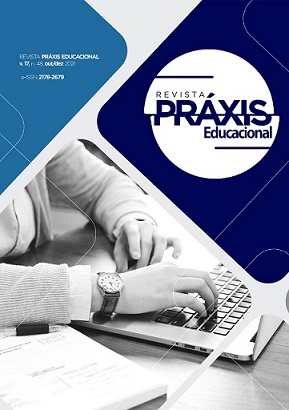The shutzian phenomenological approach and its application in understanding the pedagogical practice of the final years of fundamental education
DOI:
https://doi.org/10.22481/praxisedu.v17i48.9238Keywords:
Schutzian Sociological Phenomenology, Pedagogical practice, Elementary SchoolAbstract
This article highlights the methodological aspect of the research carried out in the master's program. it is here to show the internal coherence between the object and the chosen methodological approach. Of a qualitative nature, the research was developed with teachers from the municipal public network, through semi-structured interviews decoded by content analysis. In this way, metanarratives were produced, material necessary for understanding the meanings attributed by teachers to the pedagogical practices they develop. Following this perspective, it was possible to understand the meanings of pedagogical practices attributed by teachers, from the final years of elementary school, as
phenomena linked to the context of their social interactions, due to the interpretive processes they use when dealing with situations. The Schutzian phenological approach allowed the perspective of pedagogical action as an action endowed with meanings that, when revealed, through research, allow the enunciation of different configurations of practices, marked by idiosyncratic beliefs and values, even though government prescriptions are included there.
Downloads
References
AMADO, João, (org.). Manual de investigação qualitativa em educação. 3.ed. Coimbra: Imprensa da Universidade de Coimbra, 2017.
AMADO, João; COSTA, António Pedro; CRUSOÉ, Nilma. Procedimentos de análise de dados. In: AMADO, João (Coord.). Manual de investigação qualitativa em educação. Coimbra: Imprensa da Universidade de Coimbra, 2017.
AMADO, João; CRUSOÉ, Nilma; VAZ-REBELO, Piedade. Quadros analíticos da investigação qualitativa em educação. In: AMADO, João (Coord.). Manual de investigação qualitativa em educação. Coimbra: Imprensa da Universidade de Coimbra, 2017.
CRUSOÉ, Nilma Margarida de Castro Crusoé; SANTOS, Edmilson Menezes. Fenomenologia sociológica de Alfred Schutz: contribuições para a investigação qualitativa em prática educativa. Rev. Tempos Espaços Educ. v.13, n. 32, e-13274, jan./dez, 2020.
CRUSOÉ. Nilma Margarida de Castro. Prática pedagógica interdisciplinar na escola: sentidos atribuídos pelas professoras. 1. Ed Curitiba, PR: CRV, 2014.
GIL, Antônio C. Como elaborar projetos de pesquisa. São Paulo: Atlas, 2002.
LAVILLE, Christian e DIONNE, Jean. A Construção do Saber: manual de metodologia da pesquisa em ciências humanas. Porto Alegre: Artmed/Belo Horizonte: UFMG, 1999.
MENEZES, Edmilson & CRUSOÉ, Nilma Margarida de. Fenomenologia Sociológica de Alfred Schutz: Contribuições para a investigação qualitativa em prática educativa. Congresso Ibero-Americano em Investigação Qualitativa. Atas CIAIQ 2019. Disponível em: https://proceedings.ciaiq.org/index.php/CIAIQ2019/issue/view/27. Acesso em 20 nov.2019.
MINAYO, M.C. de S. O desafio do conhecimento: Pesquisa Qualitativa em Saúde. (12ª edição). São Paulo: Hucitec-Abrasco, 2010.
SHULTZ, A. Sobre fenomenologia e relações sociais. Edição e organização: Helmut T. R. Wagner. Tradução: Raquel Weiss. Petrópolis, RJ: Vozes, 2012.
VOGEL, Acedriana Vicente. Bananeira não dá pêra: e outras crônicas sobre educação. Curitiba, Editora Piá: 2020.
Downloads
Published
How to Cite
Issue
Section
License
Copyright (c) 2021 Práxis Educacional

This work is licensed under a Creative Commons Attribution-ShareAlike 4.0 International License.
Você é livre para:
Compartilhar - copia e redistribui o material em qualquer meio ou formato; Adapte - remixe, transforme e construa a partir do material para qualquer propósito, mesmo comercialmente. Esta licença é aceitável para Obras Culturais Livres. O licenciante não pode revogar essas liberdades, desde que você siga os termos da licença.
Sob os seguintes termos:
Atribuição - você deve dar o crédito apropriado, fornecer um link para a licença e indicar se alguma alteração foi feita. Você pode fazer isso de qualquer maneira razoável, mas não de uma forma que sugira que você ou seu uso seja aprovado pelo licenciante.
Não há restrições adicionais - Você não pode aplicar termos legais ou medidas tecnológicas que restrinjam legalmente outros para fazer qualquer uso permitido pela licença.












